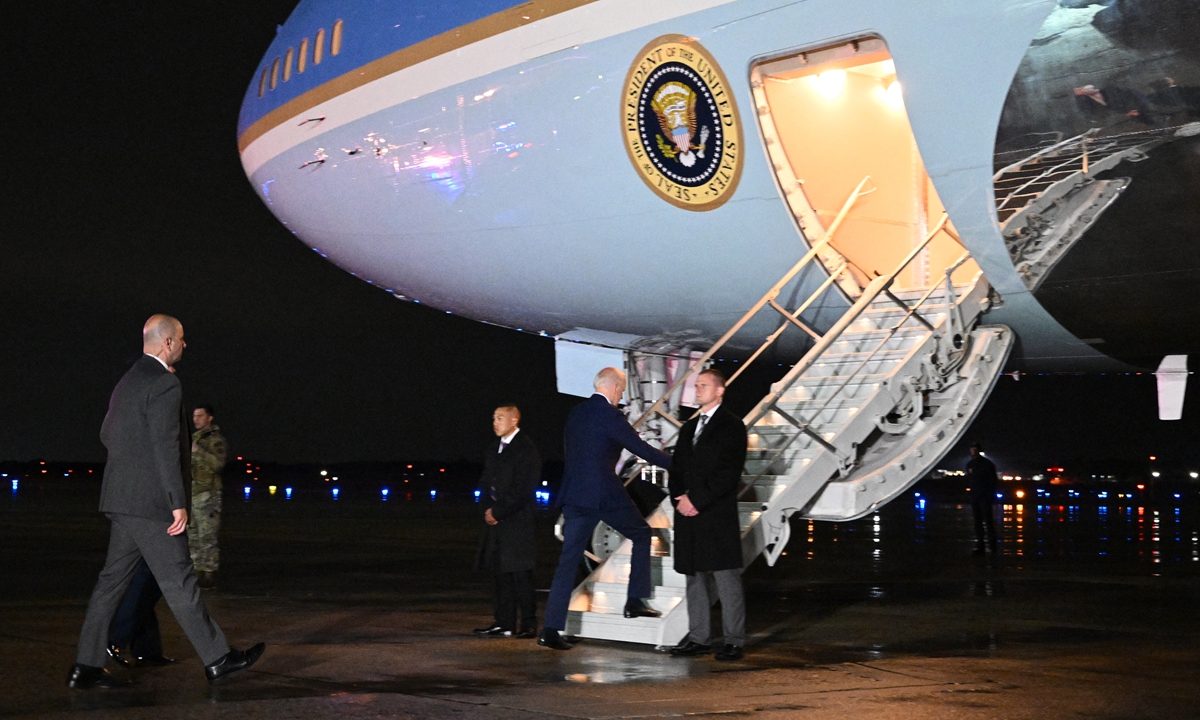
US President Joe Biden makes his way to board Air Force One before departing from Andrews Air Force Base in Maryland on July 12, 2022.
US President Joe Biden is set to embark on his first trip to the Middle East since taking office. Despite it being a routine visit, the trip has attracted extensive attention from global media and has been strongly questioned by US political circles and public opinion. In the face of such criticism, Biden wrote an article and had it published on Washington Post on July 9, attempting to find noble excuses for his Middle East visit. This rare move reflects the huge controversy triggered by the trip.
One primary reason why Biden's trip to the Middle East has attracted much attention is that the visit contains several paradoxes.
First, Biden, who promised during his 2020 presidential campaign to make Saudi Arabia a "pariah," bowed to reality and has been forced to schedule the visit for increasing oil supplies. This means the Biden doctrine, based on "democracy" and "values" diplomacy, has collapsed.
Second, Biden made reviving the Iran nuclear deal a key priority as he entered the Oval Office. When negotiations stalled, the White House urged Arab countries to team up with Israel to counter Iran. This move will irritate Iran and complicate the talks.
Third, although the Biden administration has been determined to reduce its commitment to the Middle East, in a bid to deal with China and Russia, it is reluctant to lose its hegemony in the region. As a result, the Biden administration is attempting to increase its presence in the Middle East through visits and building deeper military ties in order to maintain its fragile Middle Eastern alliance system.
Fourth, even though Biden is set to visit Israel and Palestine, seemingly to promote peace in the region, he has avoided the Palestinian issue, a root cause of Middle East issues. The US' Middle East peace agenda has actually been kidnapped by Israel. When the Palestinian issue has been marginalized, the US instead promoted the normalization of relations between Israel and some Arab countries, glorifying it as a Middle East peace breakthrough. Such practices are in fact detrimental to achieving real peace in the region.
Biden's Middle East tour may seem quite high-profile and the US president wishes to showcase US leadership, but against the backdrop of the Russia-Ukraine conflict, global and regional geopolitical landscapes have undergone drastic changes. This will make it harder for Biden to reach his goal. Ultimately, the trip will turn out to be no more than a photo op.
To begin with, the goal for an increased oil supply will be hard to reach. Biden wants oil producers in the region to increase oil production and supply for Europe. This will, on the one hand, reduce the negative impact of the West's sanctions on Russia, on the other, resolve the problems of soaring oil prices, inflation, economy and people's livelihood. The US will hold its midterm elections in a few months and its presidential election in two years. Biden wants to get reelected. To save his popularity, he has to go to the Middle East. As for the interests of US Middle Eastern allies, this is not in Biden's consideration.
Second, Biden's vision of a Middle East security plan will intensify regional bloc confrontation. During this visit, Biden will hold a summit with Arab allies in Jeddah, Saudi Arabia and aim to establish a "Middle East Air Defense Alliance" against Iran. The US is attempting to turn it into a "Middle East version of NATO."
However, the alliance would be limited to only primary military cooperation, which is far from a complete and real military alliance. The US only uses it to appease its Middle Eastern allies and to palter with those allies' security demands. In addition, different perceptions of the so-called Iran threat among members determine that the "Middle Eastern version of NATO" lacks substance and is doomed to fail. However, this alliance, which is of more symbolic significance, will deal a blow to the easing relations among major countries in the Middle East, and may force countries in the region onto the old path of confrontation.
Third, it's difficult for the US to stop the decline of its alliance system in the Middle East. Washington has only paid lip services to its allies in the region, not satisfying their security demands, and it still clings to human rights diplomacy, all of which have undermined allies' strategic trust in the US. The alliance relationship is hard to return to what it was in the past.
Since the Russia-Ukraine conflict broke out, the international energy supply crisis has greatly boosted the strategic independence and confidence of oil-producing countries such as Saudi Arabia. They don't buy the US' hypocritical Middle East policy any more. The US strategic contraction in the Middle East has made their illusion of US protection vanish into thin air. Major power competition provides greater strategic space for Middle Eastern countries, whose national interests have become more diversified. This determines that they won't take sides among major powers as US has demanded, but instead, will continue to maintain close cooperation with China and Russia.
The Middle East diplomacy of the Biden administration is full of paradoxes. Biden's Middle East trip is being carried out in a high-profile manner, but this cannot change the fact that he will return empty-handed, nor can it save the US decline in the Middle East.
The author is a professor of the Middle East Studies Institute at Shanghai International Studies University. opinion@globaltimes.com.cn




